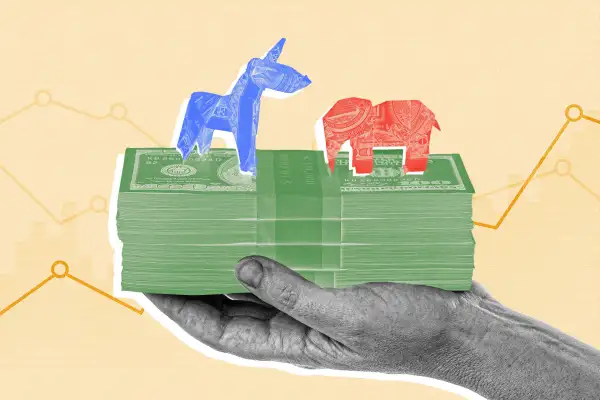60% of Investors Are Making This Mistake Ahead of the Presidential Election
Money is not a client of any investment adviser featured on this page. The information provided on this page is for educational purposes only and is not intended as investment advice. Money does not offer advisory services.

America is just over seven weeks away from Election Day, and investors are beginning to get as jittery as both parties' supporters. According to a recent survey conducted by global asset management group Janus Henderson, 6 in 10 investors say they plan to reduce portfolio risk until the election is decided.
But is that a good move? Despite recent volatility, the market continues to show signs of strength, and for investors who are shying away from stocks, shifting to conservative strategies could come at a cost.
Election year market performance
A common misconception about market performance during election years is that political unpredictability trickles into stocks and leads to poor returns.
However, data from T. Rowe Price shows that the S&P 500 performs only marginally better in non-election years. From Dec. 31, 1927, to Dec. 31, 2023, the market produced an average annual return of 11.6% in non-election years. For presidential election years, the average annual return was 11%, with the added benefit of S&P 500 returns being "generally higher in the runup to a presidential election than in non‑election years."
Because of this, the 60% of investors who say they're reducing risk exposure ahead of the 2024 election could be making a critical mistake. But allowing emotions to dictate investment decisions comes as no surprise to David Lundgren, chief market strategist and portfolio manager at Little Harbor Advisors.
"In the minds of investors, the whole world is riding on this election. Whether that's true or not, it's what people believe," he says. "And if that's the case, we know for sure that investors don't like uncertainty — and they tend to head for the hills when they're scared."
That retreat has already started. According to Reuters, during the second week of August, investors withdrew $8.92 billion from U.S. equity funds in what was the largest weekly sell-off since June 12. At the same time, money markets and government bond funds saw inflows of $16.1 billion and $3.35 billion, respectively.
Lundgren says he believes that if stocks do start to pull back in anticipation of a presidential election, investors should take advantage of those opportunities — if the market is healthy before a sell-off begins, that is.
Since emerging from the last bear market in December 2022, the S&P 500 has gained nearly 44%. The most significant pullback during that run occurred in mid-July, when the index dropped by 8.49% — but all of those losses were recovered by the end of August. Those quick bounce-backs should be expected in healthy markets like the current one, according to Lundgren.
"Right now, we can certainly say we're not in a bear market," he says. "When you get a pullback in a bull market, that weakness encourages buyers to come in, and you're back to new highs again."
Conflating economics and stocks
Another common misconception about market performance is that it's intrinsically tied to the economy. According to the Janus Henderson survey, 55% of investors are concerned about the risk of recession.
"Timing the market using economic data is absolutely a fool's errand. The average investor absolutely and erroneously conflates economic data with market health," Lundgren says. "We buy and sell stocks, not GDP."
Although concerns about the economy slipping into a recession are widespread, he says that the market, going back to 1950, hits its highest levels on average seven months before a recession even begins. It typically hits its lowest point eight months before the recession ends.
Most analysts use two consecutive quarters of economic decline — as measured by gross domestic product, or GDP — as the definition of a recession. Data from the U.S. Bureau of Economic Analysis hasn't shown GDP contraction since the second quarter of 2022. Since then, the U.S. economy has seen eight consecutive quarters of GDP expansion.
Comparing the state of the economy and the health of the stock market is akin to comparing apples and oranges, but it's something economists do because the market leads the economy.
"Economists ridicule the S&P 500 for its volatility, but they also include it in the index of leading economic indicators because they know that it turns down before recessions start and bottoms before the recession is over," he says. "Investors shouldn't be focusing on that, because by the time we know we're in a recession, over half of those [market] losses have already happened."
You can't time the market
With historical data indicating that the market performs nearly as well during election years as it does in non-election years, it's unwise for investors to be shying away from stocks in favor of cash positions or lower-risk assets like bonds and CDs, which are likely to begin offering lower yields once the Federal Reserve begins cutting interest rates this month.
The Fed's rate-cutting policy could serve as an impetus for the market to finish the year on a strong note, and market timing is, statistically, a mistake. If investors constantly change their behavior to attempt to avoid pullbacks, corrections or bear markets, they're likely to miss out on subsequent gains.
According to Hartford Funds, investors who missed the market's 10 best days over the past 30 years would have seen their gains reduced by half. The results are worse for those who missed the best 30 days of stock performances, with returns reduced by an astonishing 83%.
Instead, investors should be using perceived market weakness as a buying opportunity.
"You really shouldn't be trying to get out of the way of a 20% decline," Lundgren says. "Instead, you should be using that as a chance to buy high-quality companies that are on sale."
Hartford Funds' findings suggest that those who rode out rough patches in the market benefitted the most compared to those who tried to time the market. From 1994 to 2023, the S&P 500 would have turned an initial investment of $10,000 into $181,763 for those who sat tight. For those who missed the 30 best days during that period, that growth would've been limited to $30,889.
"You're just better off not timing the market," Lundgren says. "Pick a strategy that works over time and matches your horizon."
More from Money:
This Stock Market Stat Has Predicted 83% of Presidential Elections in the Past Century
Americans Think Inflation Will Get Worse After the Election. Should We Be Worried?
What Will Happen to the Stock Market if There's No Clear Winner on Election Night?





